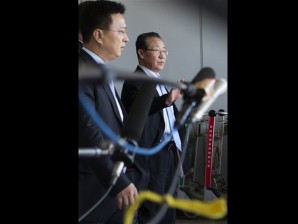China, North Korea hold strategic talks in Beijing

North Korea’s First Vice Foreign Minister Kim Kye Gwan, right, waves as he arrives at the Capital airport in Beijing, China, Tuesday, June 18, 2013. The North Korean top nuclear negotiator arrived in Beijing on Tuesday for talks with Chinese counterparts following Pyongyang’s surprise offer of dialogue with the United States. AP/Ng Han Guan
BEIJING— Negotiators from North Korea and China held strategic talks in Beijing on Wednesday following a rough patch in relations between the communist allies and Pyongyang’s surprise weekend call for dialogue with the U.S.
North Korean First Vice Foreign Minister Kim Kye Gwan arrived for talks at the Foreign Ministry with Chinese Vice Foreign Minister Zhang Yesui that were expected to focus on bilateral relations and the situation on the Korean Peninsula.
Beijing hopes the discussions will lead to a resumption of long-stalled six-nation nuclear disarmament talks hosted by China and also grouping North and South Korea, Russia, Japan, and the U.S.
North Korea angered China, its most important ally, with a long-range rocket launch and nuclear test over recent months, leading Beijing to back tightened U.N. sanctions and crack down on illicit North Korean banking activity.
That apparently prompted a visit last month to Beijing by top North Korean envoy Vice Marshal Choe Ryong Hae, who was quoted as saying Pyongyang was “willing to take active measures” to return to talks.
Article continues after this advertisementChoe’s visit was followed by renewed outreach to South Korea, and on Sunday, Pyongyang surprised many by proposing “senior-level” talks with the U.S. to ease tensions and negotiate a formal peace treaty ending the Korean War, which concluded only with an armistice.
Article continues after this advertisementHowever, in its invitation, North Korea’s National Defense Commission, the powerful governing body led by leader Kim Jong Un, insisted that there be no preconditions to talks and no demands that Pyongyang give up its prized nuclear assets unless Washington is willing to do the same.
The Obama administration responded that it was open to dialogue, but wants “credible negotiations” that involve North Korean compliance with U.N. resolutions and would lead to a nuclear-free North.
The proposal is expected to be discussed in meetings this week in Washington involving U.S., Japanese and South Korean officials.